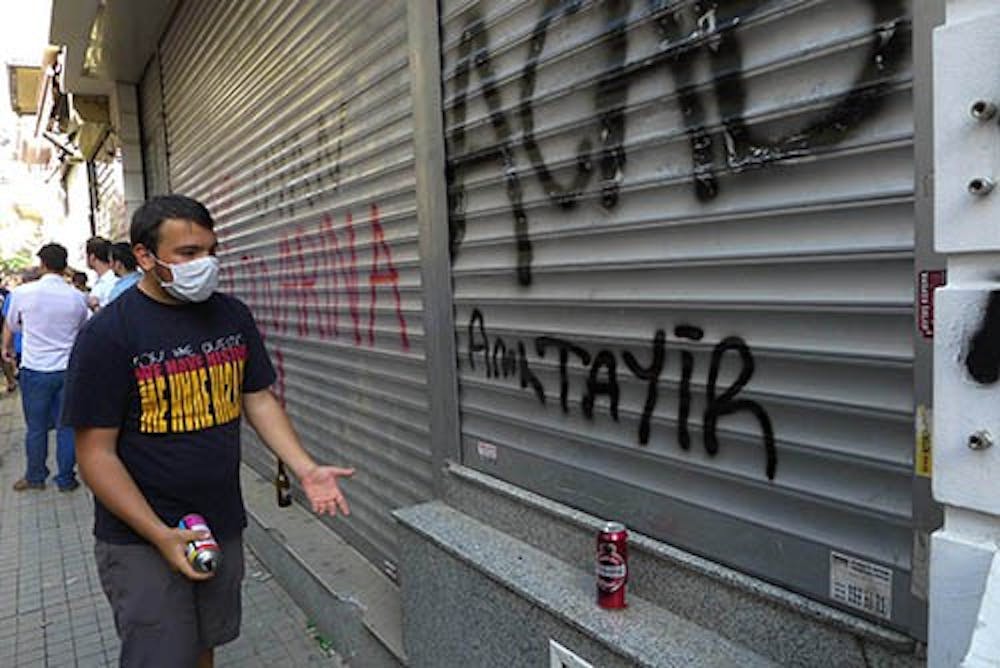ISTANBUL — Turkey’s prime minister on Sunday rejected claims that he is a “dictator,” dismissing protesters as an extremist fringe, even as thousands returned to the landmark Istanbul square that has become the site of the fiercest anti-government outburst in years.
Over the past three days, protesters around the country have unleashed pent-up resentment against Recep Tayyip Erdogan, who after 10 years in office many Turks see as an uncompromising figure with undue influence in every part of life.
A huge, exuberant protest in Taksim Square subsided overnight, but an estimated 10,000 people again streamed into the area on Sunday, many waving flags, chanting “victory, victory, victory” and calling on Erdogan’s government to resign.
About 7,000 people took part in protests in Ankara, the capital, that turned violent on Sunday, with demonstrators throwing fire bombs and police firing tear gas. Scores of protesters were detained.
Some protesters have compared Erdogan to a sultan and denounced him as a dictator. Scrambling to show he was unbowed and appealing to a large base of conservative Turks who support him, Erdogan delivered two speeches on Sunday and appeared in a television interview.
With Turkish media otherwise giving scant reports about the protests, many turned to social media outlets for information on the unrest.
“There is now a menace which is called Twitter,” Erdogan said. “The best examples of lies can be found there. To me, social media is the worst menace to society.”
Under Erdogan’s leadership, Turkey has boosted economic growth and raised its international profile. But he has been a divisive figure at home, with his government recently passing legislation curbing the sale of alcohol and taking a strong stand against the Syrian regime that some believe has put security at risk.
The demonstrations were ignited on Friday by a violent police crackdown on a peaceful sit-in to prevent the uprooting of trees at Taksim Square in Istanbul and have since spread around the country. The Turkish Doctors Association said the three days of demonstrations have left 1,000 people injured in Istanbul and 700 in Ankara.
Sunday’s violence occurred in Ankara when the protesters tried to march toward Erdogan’s office from the city’s main square. A group of youths formed a barricade and hurled fire bombs or threw back gas canisters at police.
An Associated Press reporter saw at least eight injured people being carried away, and police appeared to directly target journalists with tear gas. The state-run Anadolu Agency said 200 demonstrators were detained.
In Istanbul’s Taksim Square on Sunday, dozens of people climbed on the roof of a cultural center that Erdogan said will be demolished and turned into an opera hall. A banner reading “Don’t yield” was hung from the building.
“If they call someone who has served the people a ‘dictator,’ I have nothing to say,” Erdogan said in an address to a group representing migrants from the Balkans. “My only concern has been to serve my country.”
In another speech delivered an hour later, Erdogan said: “I am not the master of the people. Dictatorship does not run in my blood or in my character. I am the servant of the people.”
Police and protesters also clashed violently on Friday and Saturday. Clouds of tear gas overwhelmed Istanbul’s normally touristy city center.
Interior Minister Muammer Guler said some 1,750 people had been detained since Tuesday, but most had since been released.
Erdogan called the protests “ideological” and manipulated by an opposition “unable to beat [the government] at the ballot box.” He said 89 police vehicles, 42 private cars, four buses and 94 businesses were destroyed by the “vandalism” of the past two days.
Alluding to his party’s strong base, Erdogan said he had the power to summon much larger numbers of his supporters at rallies. “Our supporters are calling and saying ‘are we going to stay silent?’ but I am urging calm,” he said in an interview with Haberturk television.
Erdogan reiterated that his government would not back away from plans to uproot trees at Taksim as part of his urban renovation plans for the area. In a statement that could cause more controversy, he also declared that a mosque would be built at Taksim.
The mosque plans have long been contentious because it would further shrink the green spaces in Istanbul’s city center. Some argue that there are already plenty of mosques around Taksim.
“I am not going to seek the permission of the [opposition] or a handful of looters,” Erdogan said.
He also defended his government’s environmental record, saying it had planted two billion trees and built 160 parks since coming to office in 2002.
In Berlin, meanwhile, about 500 people staged a peaceful solidarity protest outside the Turkish Embassy.
“The people are finally standing up, speaking up and fighting for their rights,” said Hakan Tas, a deputy for the Left Party in Berlin’s local assembly, who took part in the protest.
In Greece’s second largest city, Thessaloniki, 1,000 people, many of them Turkish students, marched peacefully to the Turkish consulate, shouting slogans against Erdogan. Police blocked them from reaching the building.


